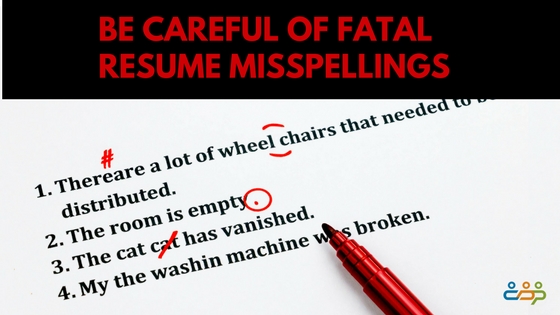I see a lot of resumes, a lot! Probably the only people that see more resumes than I do are professional recruiters. In my role helping people craft the perfect resume I see a lot of common typos and misspelled words.
One misspelling can be fatal to your resume. Typos and misspellings are a sign of inattention to detail or lack of professionalism, and can get your resume rejected immediately without further consideration.
Here are the most common misspellings I see.
Led vs. Lead – This is by far the most common misspelling I see. It is easy to see why there is confusion. Led (rhymes with bed) is the past tense of lead (rhymes with bead) and pronounced the same as lead (rhymes with bed), the metal found in batteries and ammunition. If you were the person leading the team, your resume would say that you led the team.
Manager vs. Manger – This is also very common since it is used so often on resumes, it is easy to drop the second a but because you thought you wrote manager, your mind may not see the misspelling. You are a manager if you oversee something, a manger would be found in a stable.
Ensure vs. Insure – To ensure is to make sure that something is the case. To insure is to issue or obtain an insurance policy.
Affect vs. Effect – These two pop up on resumes time and time again. Affect is almost always as a verb, as in, “The weather affected my plans.” Meanwhile, effect is generally used as a noun, as in, “The effect of the tornado was devastating.”
Judgement vs. Judgment – Another common mistake is to add an extra e to judgment. While this isn’t technically incorrect, the judgement is almost exclusively used in British English.
It’s vs. Its – While the apostrophe typically denotes a possessive, in this case, “it’s” is the contraction of it is, and “its” is the possessive.
These are all words that spellcheck will not catch. Spellcheck doesn’t see them as mistakes, but those mistakes can get your resume rejected. Use spellcheck to catch misspelled words, but don’t rely on it solely.
Here are a couple of editing tips to make sure your resume is perfect.
Spellcheck, make spell check your first line of defense against misspelled words. Spellcheck will highlight those obvious misspellings.
Print your resume, reading a paper version may make it easier to see misspellings that are not as apparent on the screen.
Have someone else read through your resume specifically to spot misspellings. A fresh set of eyes will be much more likely to spot errors.
Take time between edits, you’re more likely to overlook misspellings in words when you try to edit the work immediately. Your brain remembers what you thought you wrote not necessarily what you did write.
Read your resume backwards, examining your resume backwards, one word at a time, forces you to focus on individual words rather than reading what you think you have written.
I would be interested in any misspellings that you find yourself committing, or that are personal pet peeves of yours.
 Rick Christensen: Director, Career Transition Practice
Rick Christensen: Director, Career Transition Practice
Rick has been a career consultant for over 20 years, serving a very broad-based and diverse clientele. His specialties include effective group facilitation, one-on-one coaching and consultation at all levels including senior executives.
Rick’s passion is coaching individuals through career transitions, developing career management strategies and in identifying and sharpening competencies to open doors to new opportunities. His efforts have assisted thousands of individuals achieve their full potential.
 Rick Christensen: Director, Career Transition Practice
Rick Christensen: Director, Career Transition Practice


